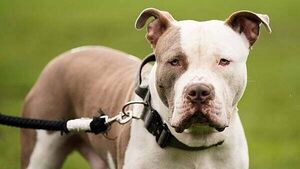Almost half of dogs involved in reported incident of aggressive behaviour were restricted breeds

Seán McCárthaigh
Restricted breeds were responsible for almost half of all reported incidents of aggressive dog behaviour last year, in cases where the breed was identified.
A total of 405 individuals also reported being physically injured as a result of being attacked by dogs in 2024, according to official figures collated by the country’s 31 local authorities.
A report published by the Department of Agriculture, however, shows there was a decline in both physical attacks by dogs on humans as well as reports of aggressive behaviour last year.
However, there was a four per cent increase in the number of incidents of attacks by dogs on farm animals, predominantly sheep.
According to the report, there were 37 fewer incidents of individuals reporting physical injuries from being attacked by dogs in 2024 down to 405 – an annual decrease of eight per cent.
It followed a sharp increase in the number of incidents the previous year when the numbers rose to 442 from 308 in 2022.
The most incidents occurred in Cork County (45) followed by Fingal (44), Dún Laoghaire-Rathdown (35), Cork City (33) and Mayo (31).
No canine attacks on humans were reported in six local authority areas – Carlow, Kilkenny, Limerick, Roscommon, Sligo and Wicklow.
A total of 1,194 incidences of aggressive dog behaviour were also reported to local authorities last year – a decrease of 14 per cent.
Cork County recorded the most number of incidents with 118 followed by Limerick (112), Dún Laoghaire-Rathdown (85), Fingal (80), Mayo (77) and Kerry (72).
More detailed information recorded about the nature of such incidents for the first time revealed that 48 per cent of dogs in cases where the breed was known, was a restricted breed.
Such breeds are required by law to be securely muzzled and restrained by a strong chain or leash not exceeding two metres and by a person over 16 who is capable of controlling the animal.
Data recorded on 769 dogs involved in aggressive behaviour last year show the dominant breed were German Shepherds who accounted for 16 per cent of all incidents.
The restricted breed, also known as Alsatians, were involved in more than double the number of incidents of the next most common breed – Staffordshire Bull Terriers – another restricted breed which were involved in six per cent of cases.
Other common breeds recorded in incidents of aggressive dog behaviour in 2024 were Jack Russell Terriers (5%); Rottweilers (4%); Border Collies/Sheepdogs (four per cent); Labradors (three per cent) and Lurchers (three per cent).
XL Bully dogs – which became the first breed of dog to be banned in the Republic when legislation came into force in October 2024 to prohibit the sale, breeding and re-homing of such animals – were recorded as being involved in 21 incidents of aggressive behaviour last year, representing just under 3% of the total number of cases.
Legislation which prohibited ownership of an XL Bully type dog without a certificate of exemption issued by a local authority came into effect on February 1st 2025.
The law banning the breed was introduced following the death of Limerick woman, Nicole Morey (23) on June 4, 2024 after she was mauled by one of her dogs, an XL Bully dog, at her home in Ballyneety, Co Limerick.
The latest figures also reveal that the number of incidents of sheep-worrying and other types of attacks by dogs on livestock rose by 4% in 2024 to 287 involving almost 2,100 animals.
Attacks on sheep accounted for over two-thirds of all cases and just under 1,600 animals.
The highest number of incidents were reported in Cork County (30) followed by Roscommon (26), Mayo (23) and Cavan and Galway County (both 21).
The report also shows that dog wardens issued a total of 1,763 fines – an annual decrease of 5% -for various offences in relation to the Control of Dogs Act, although only 34% of them were paid.
The local authority whose dog wardens issued the most fines was Fingal (464) followed by Cork County (223) and Louth (174).
One local authority – Kildare County Council – issued no fines to dog owners last year.
A total of 153 prosecutions were also taken against dog owners with two council – Fingal and Cork County – accounting for 80% of all cases – with 56 convictions recorded.
Responsibility for dog control functions was taken over by the Department of Agriculture last year from the Department of Rural and Community Development under the Programme for Government in a measure to “address the disjointed approach to dog control issues.”
All legislation and policy in relation to the control of dogs, dog welfare and dog breeding establishments now rests with the Department of Agriculture.
It said there was significant activity in the context of dog control last year with a major national media campaign to promote responsible dog ownership, while local authorities used €6m of capital funding under the Dog Control Support Initiative for various support measures including the upgrading of facilities at dog pounds and shelters.
The Department of Agriculture noted 56 per cent of dogs entering local authority pounds last year were not micro-chipped, despite it being a legal requirement for all dogs born after March 31st 2016 to be microchipped with the microchip registered on an approved database.
The report claimed a number of initiatives and supports provided by the Government since late 2023 “should improve the dog control environment in Ireland.”
It added: “The additional data now being collected should provide a clearer picture of the reasons why dogs end up in local authority shelters/pounds and provide opportunities for targeted action to prevent dogs from ending up in pounds/shelters.”
The Department of Agriculture said the report supports the need for additional focus on areas such as micro-chipping and payment of on-the-spot fines.
The latest figures show a total of 7,041 dogs including strays as well as seized and surrendered animals entered dog shelters and pounds last year.
A total of 1,332 dogs were reclaimed, while another 2,098 were rehomed with 2,960 being transferred to dog welfare groups.
The report shows 655 dogs were euthanized, representing 9% of all dogs entering pounds and shelters last year.
The rate of putting dogs down exceeded 20 per cent - more than twice the national average – in several areas including Tipperary (28 per cent), Kildare (26 per cent) and Limerick (23 per cent).





